Interview with Feminist Arely Reyes Castillo Following Her Release from Mexican Prison
By Anonymous ME
Scroll down for the Spanish version.
A few months ago we wrote about the imprisonment of feminist activists from the Okupa Cuba. Ary, one of the women detained, has been released on parole after coordinated efforts from her solicitor, friends, and family. FiLiA has successfully contacted Ary to learn more about her story:
“My name is Arely Reyes Castillo, also known as Ary. I am a 39-year-old female activist from Veracruz, Mexico, who has lived in Mexico City for over 10 years. I have been displaced as a result of violence perpetrated by various criminal groups in my hometown. I am an artisan goldsmith, masonry restorer, and carpenter, and I am skilled in various trades.”
Ary has also been an advocate for human rights for a number of years who has been a target of political persecution. Regarding her role at the Okupa Cuba she explains:
“On September 4th 2020 I took part in the landmark occupation of the Human Rights Commission office in Mexico City (CNDH) alongside other female activists. We were responding to a call for help from two bereaved mothers whose children had been victims of violent crimes. For years these mothers had been ignored by Mexican authorities, who would only prolong and make their quest for justice tortuous and painful. When these mothers arrived at the CNDH they asked for some certainty that would help them stop their pilgrimage through offices and institutions which they had approached for help and to be heard. However, when they were ignored once more and they saw they were going to be redirected to yet another institution (again), they resorted to mutiny. They tied their shoelaces to a couple of chairs and demanded attention while stating they would not leave the building until they could meet Rosario Piedra Ibarra, president of CNDH. Prior to this episode, they had filed complaints against other institutions through the CNDH in attempt to get the CNDH to issue a statement that would put pressure on the authorities in question so that they would expedite the process to get justice. The mothers wanted to make Rosario aware of their situation, and with this act of disobedience they sought to achieve some progress with the paperwork of their complaints within the CNDH.
The group of activists to which I belonged at the time listened to the request for support from these mothers and some of us responded to the call to bring bedding, food, and water, and to keep them company from outside of the CNDH building. We were pressuring the authorities to meet the mothers’ demands and we improvised a sit-in outside of the premises which would last two days and culminate in the occupation of the building as an act of protest. We were trying to make visible the CNDH’s incompetence and omissions, and the lack of empathy from their bureaucrats towards those who seek some hope for their requests of the CNDH. After that, the building was renamed as Okupa Cuba for short and it was repurposed to be a shelter for women and children who were fleeing male violence in their environment. We offered psychological support and even legal aid in some instances.”
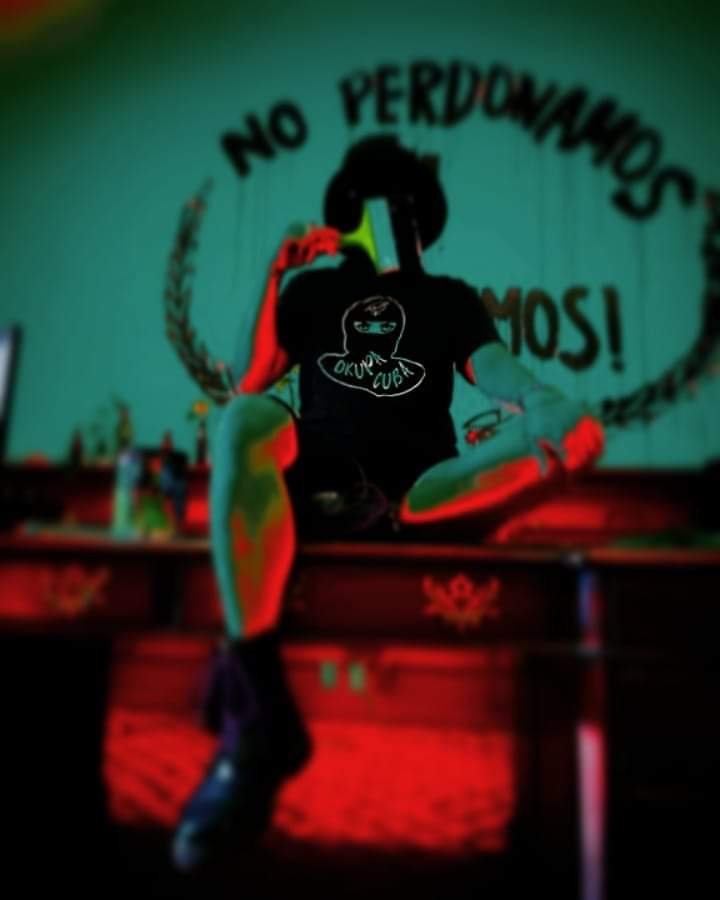
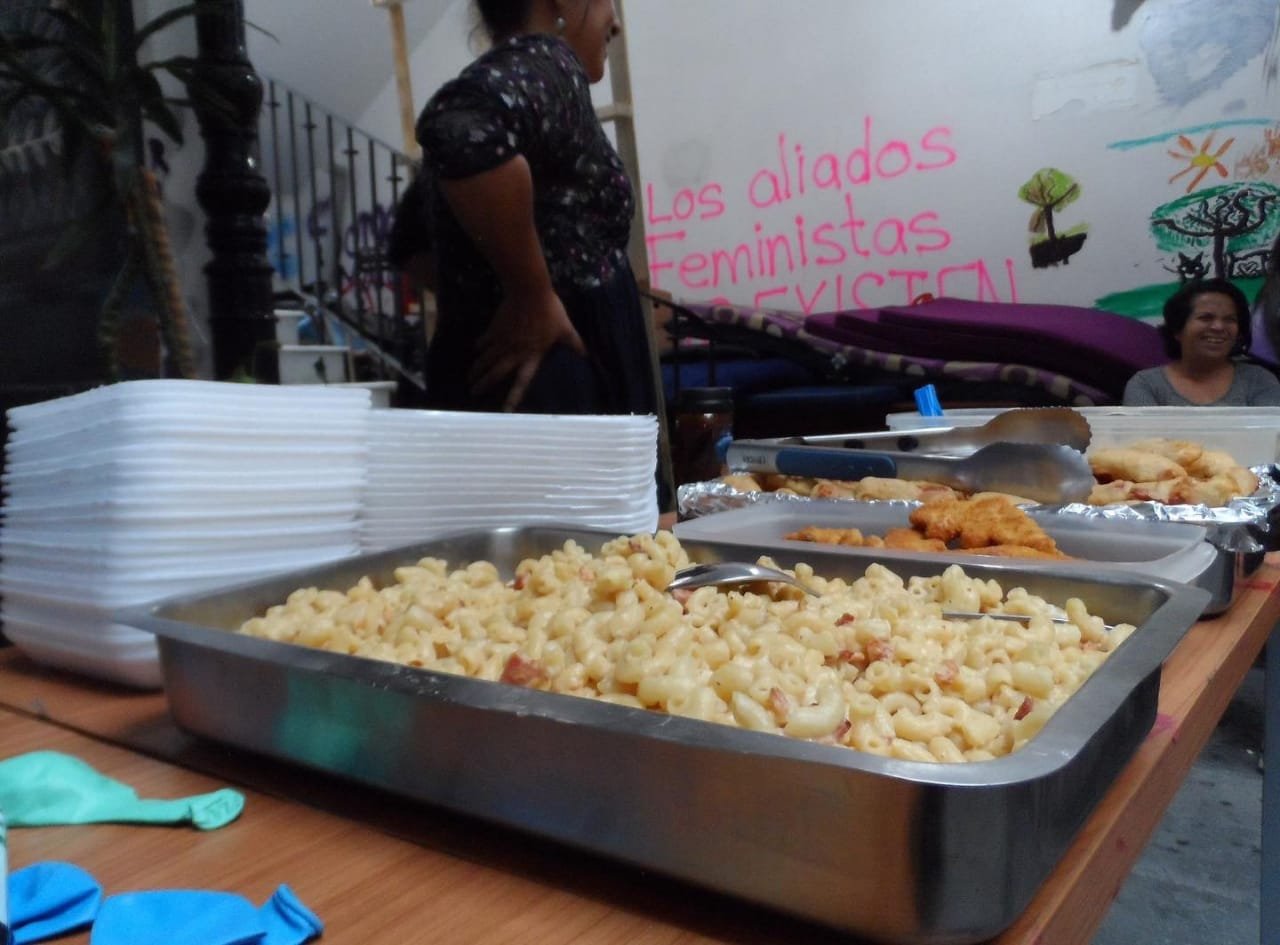
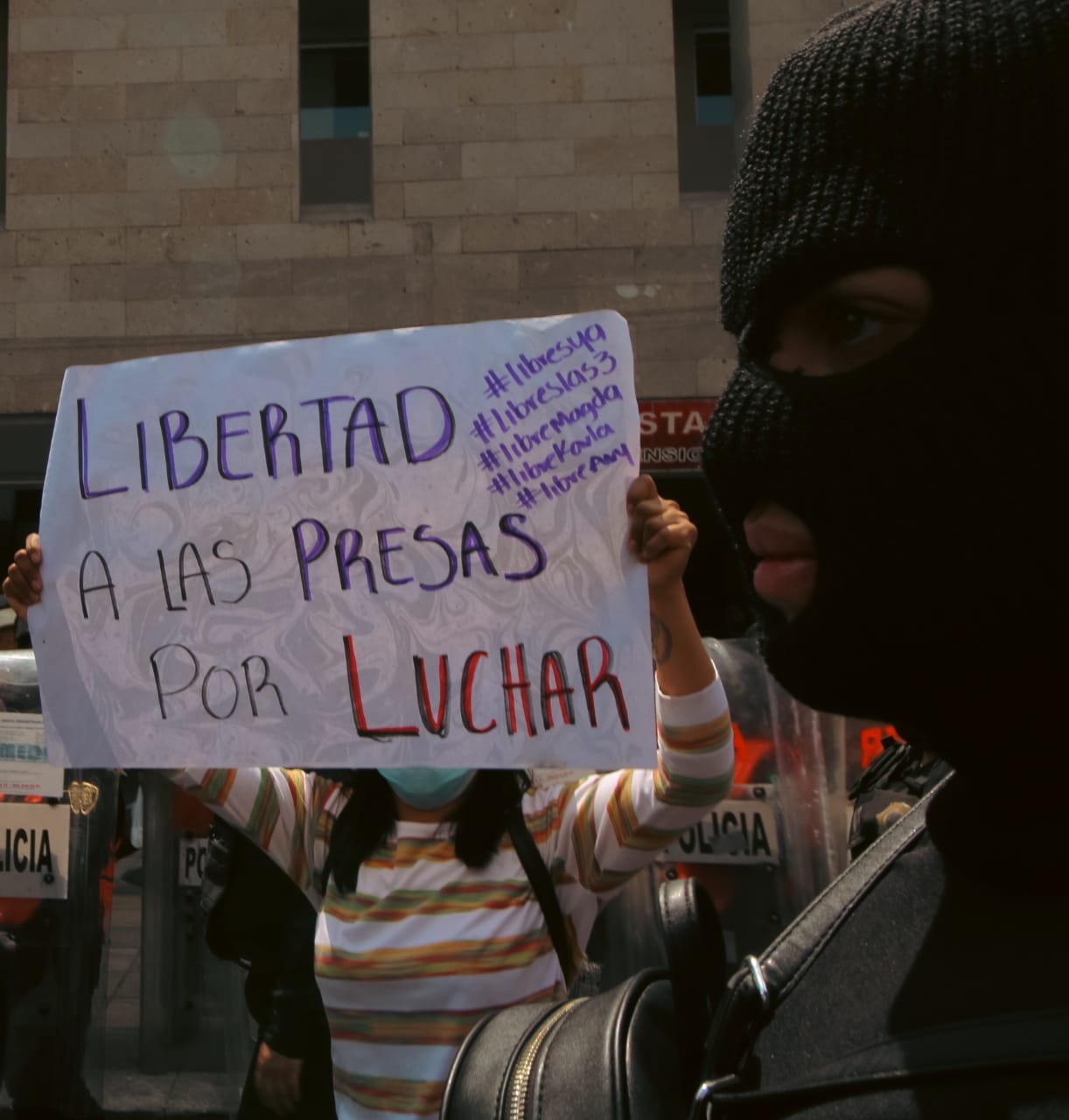
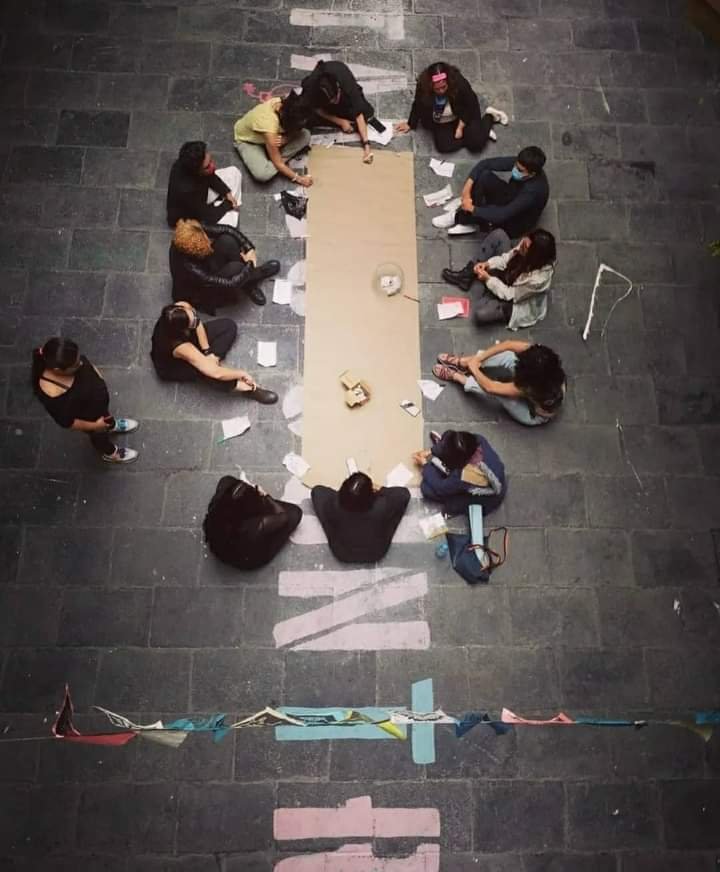
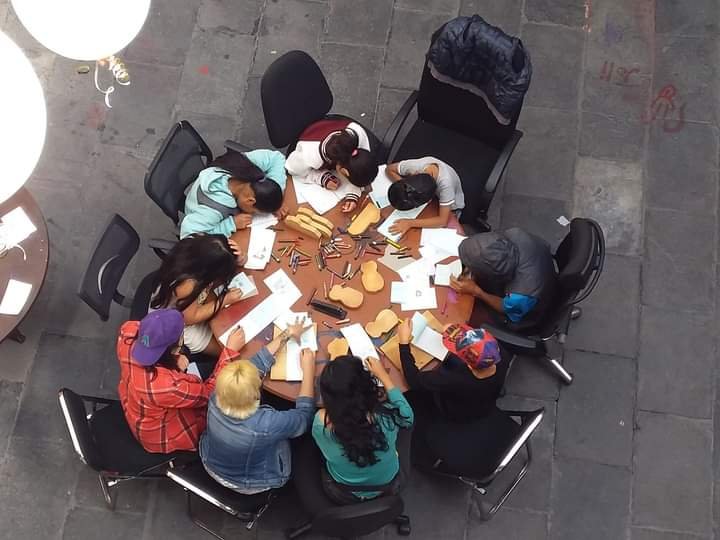
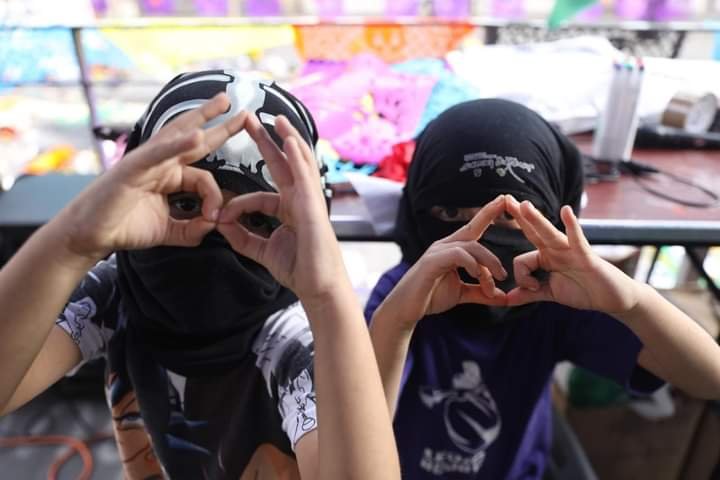
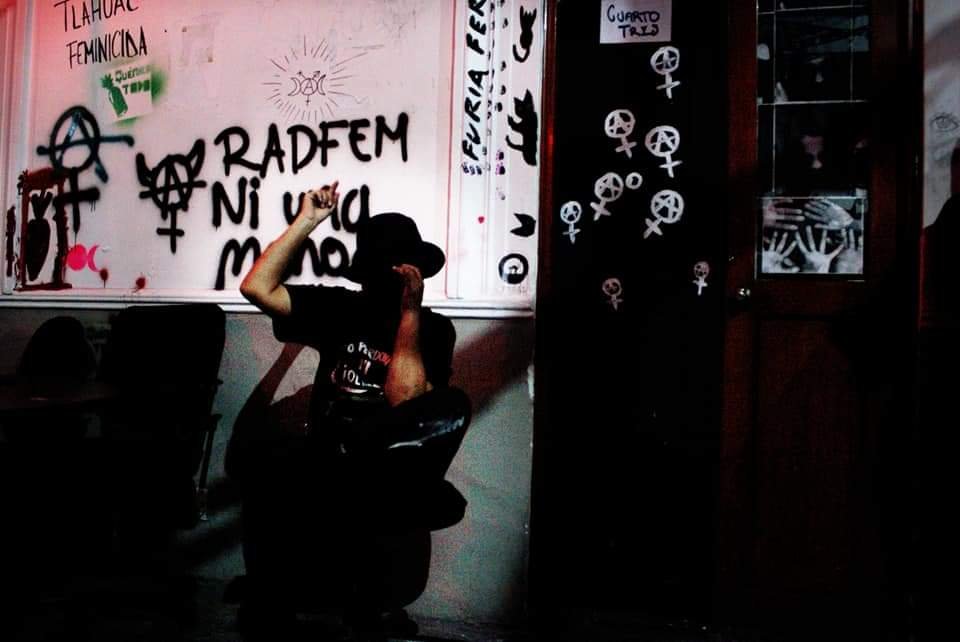
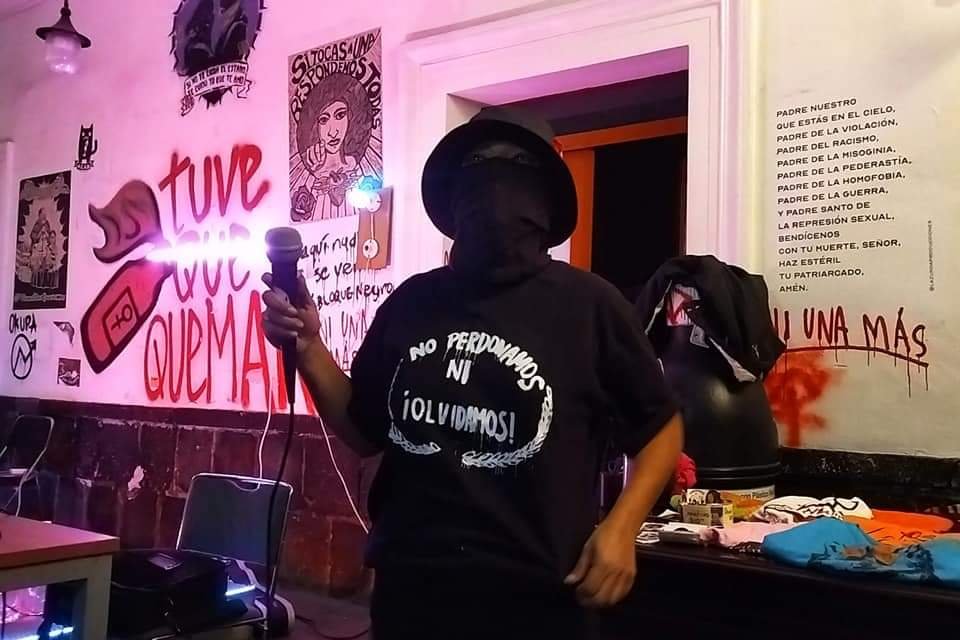
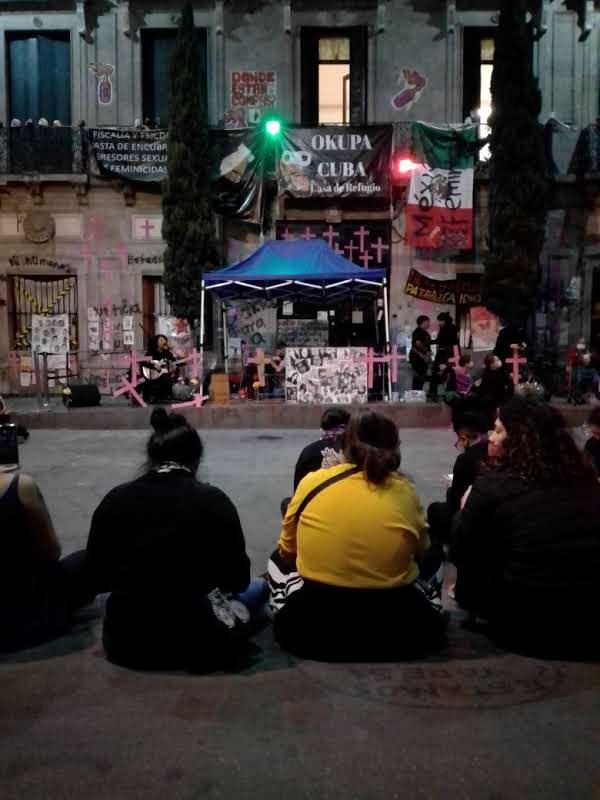
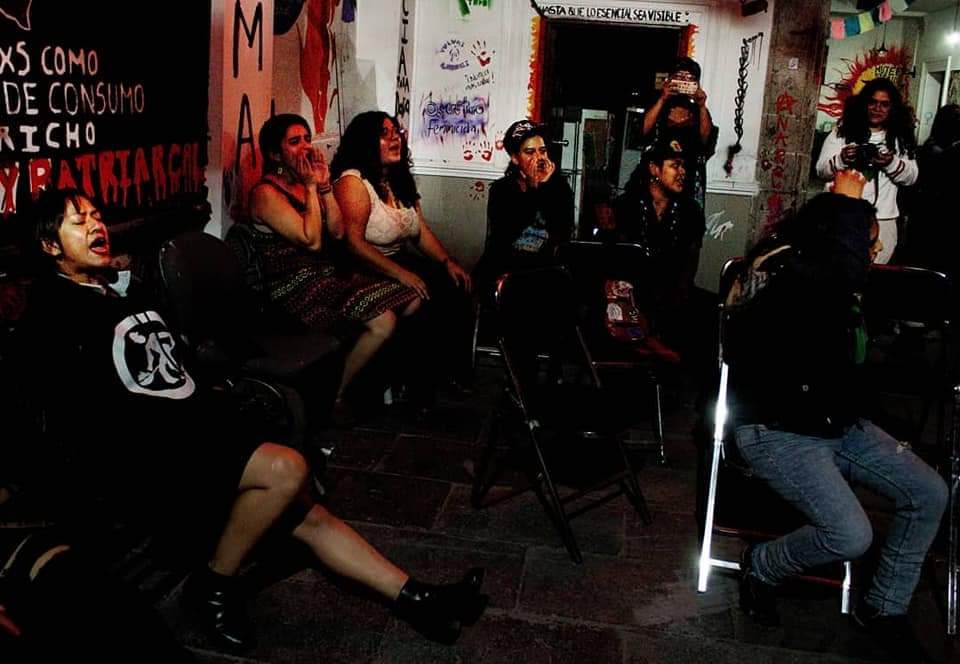
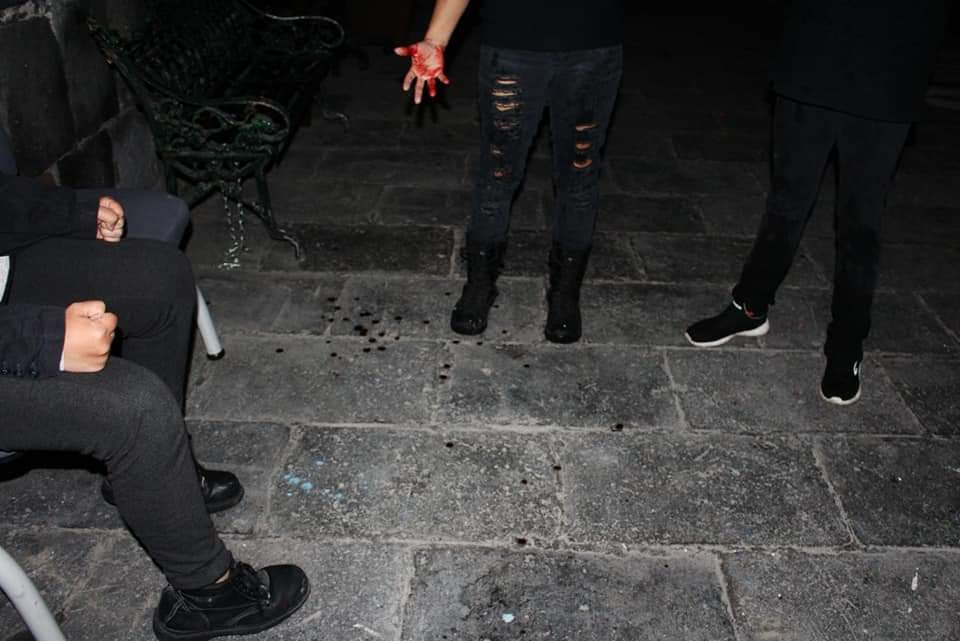
Regarding government and institutional responses, Ary says:
“From day one of the sit-in we suffered harassment from the armed wing of the Mexican government which continued every day that the building functioned as a shelter and community centre which offered educational, cultural, and artistic activities. There were two groups involved, first the ‘Ateneas’, which is a dedicated female group from the police force of Mexico City, and then Mexico City’s police. We were being monitored from different angles in the vicinity of the shelter through CCTV installed in neighbouring buildings, telephone tapping, officials who would approach the premises and start recording and taking pictures of the building and those of us who stayed overnight, even the cyber-police were watching us.
In November 2020 the Mexican state started a witch hunt aimed, first at 13 feminist activists and supporters of gender violence victims, as well as bereaved families of femicide and forced disappearance victims. There were investigation files regarding crimes allegedly committed by these people during various feminist marches. Then, at least another 20 activists, including me, have been criminalised by the government through prosecution and fabrication of criminal records, most of which involved government institutions as complainants. One such instance is the CNDH, which presumably used this criminalisation strategy after having shown ineptitude and zero ability to effectively respond to the demands of millions of Mexicans who tirelessly seek justice. Interestingly, this same strategy shows that the institution has all the tools and resources needed to investigate and put under surveillance the perpetrators who have been denounced for years by our feminist community.
Why is it decided that it is better to spend resources prosecuting us for criminal offences with no legal underpinning, than to look for and open investigations against rapists, abusers and feminicidas (those who have committed femicides)? Why does the government decide to criminalise protest and to portray us as criminals to society, instead of giving back some of the peace they have taken from us? Why fabricate crimes, when they have all the capital to go after those who abduct, kill, and rape our fellow sisters and ourselves?”
In Ary’s case, she was incarcerated as a direct result of this persecution. During the process she perceived a number of anomalies:
“The last 10 months I have been held in the Centro Femenil de Reinserción Social de Santa Marta Acatitla (Centre for Female Social Re-integration Santa Marta Acatitla). I was prosecuted for alleged possession which did not merit my detention. I was charged with this crime after I was violently evicted from the Okupa Cuba through an excessive operation carried out by more than 300 cops from the Mexico City police. The police allegedly found on me several bags containing “dried green vegetable substance”, for which I was transferred to the prosecutor’s office that did not correspond to the geographical location where I supposedly was found in the act of committing the offence. I was denied my right to make a phone call, to communicate with my family or a solicitor.
This is where my ordeal starts, a struggle that originated in being a citizen who caused discomfort for the government in charge of my country. I am currently out on parole regarding another crime of which I have been accused, just a few days after the first crime was fabricated. Three months after the criminal proceedings started I was notified of a new file of a federal investigation that has been open since 2021. I have not yet been informed about the details of the actual crime they are trying to charge me with. I do know, however, that the allegation is coming from the CNDH through their legal representative.”
Later, the zealous scrutiny of activists carried out by Mexican authorities surfaced. Ary continues:
“At the end of September 2022, on national television during a news broadcast, it came to light that a group of hacktivists from an international organisation called ‘Guacamaya’, had gained access to sensitive anonymous reports and documents. These were leaked through a hacking operation against the digital platforms of the Secretaría De La Defensa Nacional (Mexican Ministry of Defence, SEDENA). In the leaked documents there was substantial evidence of the political persecution that many of us, feminist activists, are experiencing and which is orchestrated by the Mexican government. In one section, within the nearly 6 terabytes which were obtained from the SEDENA reports, it is possible to find the names of numerous feminist activists, including mine, as evidence of the espionage that was targeted at me and fellow activists who took part in the occupation of the CNDH. This contradicts Andrés Manuel López Obrador’s (president of Mexico) discourse, in which he claims that the government is not spying on activists and that his administration is empathetic with the people and their current social struggles.”
As one would expect, this direct attack against activists has had serious consequences on Ary’s life:
“The persecution against me, my detention, and the media lynching have been exhausting, and have resulted in anxiety, paranoia, and post-traumatic stress for me. In addition to that, there is the toll of my activities in the Okupa. I was the front woman in the shelter, in charge of supporting women who visited because they needed emotional and legal assistance. I had to be on a constant state of alert and vigilance to ensure the safety of the space. I was making sure that the sheltered women and, more than anyone, the children who lived there had their basic needs of clothing, education and work activities met.
These and other duties negatively impacted my physical and mental health, resulting in the Caregiver Stress and Burnout Syndrome. This was caused by a lack of a close-knit support network to which I could delegate some of these responsibilities. At some point, not knowing how to delegate and having to be there for others became my priority and my personal needs were side-lined. After some time, the exhaustion became so severe that I was having episodes of irritability which fractured the group who were sharing space with me. There were days in which I could not get out of bed at all, and others in which I had chronic insomnia. My health was seriously damaged. On the other hand, the support, assistance, and physical presence that we were able to provide for women and children in that place made it all worth it and rewarding. I can say that this place [the Okupa] changed the life of a lot of people and I am proud of having been part of it.
Since the prosecution has agreed to parole I have started the process of trying to heal in all aspects of my life. However, the state-sanctioned surveillance hanging over me is harsh. As is implied in the name, I need to comply with certain conditions to be able to continue my process outside of prison; otherwise they would detain me again in the Social Re-Integration Centre [female prison].”
Finally, Ary sends us this powerful message:
“Fellow women who read my words from other nations, I would like to tell you that today more than ever we need your ears and your voices. We need the world to turn and see what is happening in my country. You are the eyes and the voices that will prevent all this going unnoticed and ending up in the archive of collective memory. Today more than ever we need an objective analysis of the criminalisation of protests, particularly feminist protests, which comes from sources and through media outlets that are not co-opted by the Mexican government. We need to put pressure on the government to rectify the measures it is taking against female activists. We need recognition of the fact that we are being stigmatised through the narratives given out via mass media, in which we are being demonised and which promote media lynching by the taking out of context the articles and pieces they put forward about the feminist community. We need a call for human rights advocacy groups abroad. They can act as observers of the actions perpetrated by the Mexican institutions claiming to defend our rights, and of how these acts contribute to the witch hunt. We need to call an international feminist assembly so you can see with your own eyes and witness the repression we have been subjected to in this country. So you can observe the political chicanery aimed at the disarticulation of the only social movement that has shaken the foundations of a system that does not allow people to demand the defence of their fundamental rights, even from their own government.
We need the world to turn and see the practices and tactics of criminalisation and persecution of activists, journalists, victims of crimes committed by institutions such as SEDENA, bereaved families of forced disappearance victims, mothers and daughters of femicide victims, and members of indigenous peoples who are defending their territories.
We need to make it visible that anyone who takes part in current social movements is considered an enemy of the state and is persecuted accordingly, demonised and criminalised as a repressive measure, thus, violating the principle of no-aggression besides committing a frontal attack on their fundamental human rights. It is against the constitution to be repressed for protesting. It is also against the constitution to show no capacity of response on the part of the government when faced with the problems that we activists denounce. Here’s to fewer people in jail and housing for everyone.
Nothing will be the same for us. The same will give us nothing.”
#NoToHoodiePersecution #MemoriesOfTheOkupaCuba #WeAreNotCriminalsWeAreRefugees #ItWasTheState #FreeAry #AryIsARefugee #OccupyIsNotACrime #AsFarAsItTakes #FreeALL #NoToCriminalisationOfFeministProtest #HouseOfShelterAndJoy #OkupaCuba #LivingMonumenta #NoALaPersecuciónDeLaCapucha #MemoriasDeLaOkupaCuba #NoSomosDelincuentesSomosRefugiadas #FueElEstado #AryLibre #AryEsRefugiada #OkuparNoEsUnDelito #HastaDondeTope #LibresTODAS #CasaDeRefugioyGozo #NoALaCriminalizaciónDeLaProtestaFeminista #MonumentaViva
Entrevista con la feminista Arely Reyes Castillo tras su liberación de una prisión mexicana
Hace algunos meses habíamos reportado la detención de las activistas feministas de la Okupa Cuba.
Ary, una de las compañeras detenidas, [https://www.facebook.com/aryhermanaacaestatumanada], ha obtenido su libertad condicional después de las acciones y movilizaciones organizadas por su equipo legal, familia y amigas. FiLiA ha logrado contactar con Ary para saber más de su historia:
“Me llamo Arely Reyes Castillo. La gente me conoce como Ary. Soy una mujer activista de 39 años originaria del estado de Veracruz y radicada en la ciudad de México desde hace 10 años. Desplazada por la violencia que ejercían los diversos grupos delictivos en mi ciudad de origen. Soy artesana orfebre, restauradora, carpintera...desempeño y domino diversos oficios.”
Ary ha sido también defensora de DDHH desde hace ya varios años y perseguida política del Estado Mexicano. Con respecto a su participación en la Okupa Cuba nos señala:
“El 4 de septiembre del 2020 participé en la toma histórica del edificio de la Comisión Nacional de Derechos Humanos (CNDH) [en México] junto con otras activistas que acudimos al llamado de dos madres de víctimas que habían sido ignoradas durante muchos años por el estado mexicano quien alargaba y volvía tortuosa su búsqueda de justicia. Ellas, al llegar a dicha institución pedían una certeza para dejar de peregrinar entre las muchas instituciones a las que habían asistido pidiendo ser escuchadas. Pero al volver a ser ignoradas y pretendiendo canalizarlas nuevamente a otra dependencia decidieron amotinarse atando las agujetas de sus tenis a un par de sillas exigiendo atención y manifestando no saldrían del edificio hasta poder exponer su situación a la presidenta de dicha institución, Rosario Piedra Ibarra, como un acto de protesta cuya finalidad era conseguir un avance en las quejas que se habían interpuesto en un intento de que la institución emitiera alguna recomendación que obligara a las autoridades a actuar con celeridad ante la injusticia de la que estaban siendo víctimas. El grupo de activistas al que pertenecía en ese entonces escuchamos y atendimos la solicitud de acompañamiento y algunas de nosotras acudimos a las afueras de la CNDH para llevarles cobijas, comida y agua y acompañarlas desde afuera para hacer mayor presión a sus demandas improvisando un plantón que duraría dos días y que culminaría en la toma del edificio como un acto de protesta que pretendía visibilizar la incompetencia y omisión de la CNDH y la poca empatía de sus funcionarios ante quienes buscaban en ella una esperanza para sus demandas. Posteriormente el edificio fue renombrado como Okupa Cuba y se destinó para refugiar a mujeres e infancias que huían de la violencia machista de sus entornos, acompañándolas sicológicamente y asesorándolas en algunos casos jurídicamente.”
Acerca de las acciones institucionales y gubernamentales Ary apunta:
“Desde el día 1 del plantón y posteriormente permaneciendo dentro del edificio sufrimos acoso por parte del brazo armado del gobierno mexicano cada uno de los días que el edificio fungió como refugio, centro cultural educativo y artístico, primero por la agrupación ‘Ateneas’ [agrupamiento femenil de la policía de Ciudad de México (CDMX)] y después por la policía capitalina de la CDMX. Fuimos vigiladas y monitoreadas desde diferentes puntos cercanos al refugio mediante cámaras colocadas en edificios vecinos, intervenciones a las líneas telefónicas personales, funcionarios que se acercaban a grabar y a tomar fotos tanto del edificio como de quienes pernoctábamos dentro de él e incluso por parte de la policía cibernética. En noviembre del año 2020 el Estado Mexicano empezó una cacería de brujas dirigida primero hacia 13 activistas feministas y acompañantes de víctimas de violencia de género y de familiares de víctimas de feminicidio y desaparición a quienes se les abrieron carpetas de investigación por delitos supuestamente cometidos durante diferentes marchas feministas. Posteriormente al menos otras 20 activistas, entre ellas yo, hemos sido criminalizadas por el gobierno mediante la imputación de carpetas de investigación de las que la parte acusadora son instituciones gubernamentales principalmente, como la CNDH de quién podría especular utilizó esta estrategia de criminalización después de haber exhibido la nula capacidad de respuesta efectiva a las demandas que millones de mexicanas y mexicanos interponemos en la búsqueda incansable de justicia. Esta estrategia pone en evidencia que poseen todas las herramientas y recursos para investigar y someter a monitoreo a los agresores que durante años la comunidad feminista ha denunciado. ¿Por qué se decide que es mejor gastar recursos imputándonos delitos que no tienen sustento jurídico en lugar de buscar y abrir procesos contra violadores, abusadores y feminicidas? ¿Por qué razón el gobierno decide criminalizar la protesta y exponernos como delincuentes ante la sociedad en lugar de regresarnos una poca de la tranquilidad que nos han quitado? ¿Por qué fabricar delitos, cuando tienen todo el capital para ir en contra de quienes desaparecen, asesinan y violan a nuestras compañeras y a nosotras mismas?”
En su experiencia personal esta persecución resultó en encarcelamiento, proceso durante el cual nos explica haber percibido una serie de irregularidades:
Los últimos 10 meses estuve recluida en el Centro Femenil de Reinserción Social de Santa Marta Acatitla por un supuesto delito de posesión que no ameritaba prisión preventiva al que se me vinculó después de que fuera desalojada violentamente de la Okupa Cuba mediante un operativo excesivo donde participaron más de 300 elementos de la policía capitalina quienes supuestamente me encontraron varias bolsas que contenían "vegetal verde seco" por lo que se me traslada a una fiscalía que no pertenece a la alcaldía donde supuestamente se me descubre en flagrancia de delito y se me priva del derecho de hacer una llamada, de tener comunicación con mi familia y abogado y dónde empieza el calvario por ser una ciudadana incómoda para el gobierno que dirige mi país. Actualmente me encuentro en libertad condicional por otro delito del que fui acusada a los pocos días de que se me fabricara el primer delito. A tres meses de haber sido vinculada a proceso me notifican de una nueva carpeta de investigación de orden federal que se me había abierto desde el 2021 y de la cual aún no se me ha informado cuál es el delito que se me imputa pero de la que tengo conocimiento la acusación me la interpone la CNDH mediante su representante legal.
Poco después se hace público el escrutinio de las autoridades mexicanas, del cual Ary nos explica:
“A finales de septiembre del 2022, en un noticiero de la televisión abierta se dio a conocer que un grupo de hacktivistas pertenecientes a una organización internacional denominado Guacamaya había obtenido información sensible de informes anónimos y documentos, estos se obtuvieron de un hackeo a las plataformas digitales de la Secretaría De La Defensa Nacional (SEDENA) dónde se exponía y evidenciaba la persecución política que estamos sufriendo muchas activistas feministas de parte del gobierno [mexicano] [enlace: https://www.filia.org.uk/latest-news/2022/12/26/why-is-the-mexican-government-funding-the-surveillance-of-feminist-activists]. En un apartado de los casi 6terabites que se lograron extraer de los informes de dicha institución aparecen los nombres de varias activistas feministas entre los cuales aparece mi nombre como evidencia del espionaje que estaba dirigido hacia mí y hacia otras compañeras que participaron en la toma de la CNDH. Esto pone en entredicho el discurso del presidente Andrés Manuel López Obrador dónde aseguraba que el gobierno no espía activistas y que su gobierno es empático con el pueblo y la problemática social actual.”
Como es de esperarse, este ataque frontal contra activistas ha tenido graves consecuencias en la vida de Ary:
“La persecución hacia mi persona, la detención y el linchamiento mediático han sido desgastantes y ha derivado en problemas de ansiedad, paranoia y estrés postraumático además de que la responsabilidad de haber estado al frente del refugio, atender a mujeres que acudían para asesoría jurídica y contención, el mantener un estado permanente de alerta y vigilancia por la seguridad del lugar, checar que las refugiadas y sobre todo las infancias que habitaron el lugar tuvieran las condiciones elementales de comida ropa educación y actividades laborales entre otras responsabilidades repercutió tanto en mi salud física y mental derivando en el Síndrome del Cuidador Quemado ocasionado por la falta de una red de apoyo cercana en la que pudiera delegar algunas de estas responsabilidades. En algún momento no saber delegar y tener que estar para otras pasó a ser prioridad y mis necesidades personales pasaron a un segundo plano. Con el tiempo el cansancio era tan grave que empecé a tener episodios de irritabilidad que provocaron fracturas dentro del mismo grupo que habitaba el espacio, había días en que no podía levantarme de la cama y otros en que tenía lapsos de insomnio crónicos. Mi salud mermó mucho aunque el apoyo y acuerpamiento que se le brindó a mujeres e infancias en el lugar hicieron que todo valiera la pena y que resultara gratificante. Puedo decir que ese lugar cambió la vida de muchas personas y me enorgullezco de haber sido parte de ello. A partir de que la fiscalía accede a darme un beneficio de libertad condicional empieza un proceso de intentar sanarme en todos los aspectos. Sin embargo el monitoreo que el estado tiene sobre mí es muy severo ya que como el concepto lo indica debo cumplir ciertas condiciones para poder llevar mi proceso en libertad de lo contrario volverían a internarme en el Centro de readaptación social.”
Para finalizar, Ary nos dedica las siguientes palabras:
“Compañeras que me leen desde otras naciones, quisiera decirles que hoy más que nunca necesitamos de sus oídos y sus voces. Necesitamos que el mundo voltee a ver lo que está pasando en mi país. Ustedes son los ojos y las voces que evitarán que todo esto pase desapercibido y termine en el archivo de la memoria colectiva. Hoy más que nunca necesitamos que desde otros lugares y con medios de difusión que no están coaptados por el gobierno mexicano se haga un análisis objetivo sobre la criminalización de la protesta, en particular de la protesta feminista. Necesitamos que se haga presión sobre las medidas que el gobierno está imponiendo a las mujeres activistas y que se reconozca que se nos está estigmatizando a través de los discursos que se emiten en los medios de comunicación que nos satanizan y promueven el linchamiento mediático al sacar de contexto las notas que aparecen en ellos sobre la comunidad feminista. Necesitamos que se convoquen a organizaciones defensoras de DDHH extranjeras que hagan de observadoras de lo que las instituciones mexicanas que dicen defendernos están haciendo para sumar a la cacería de brujas. Necesitamos convocar a una asamblea feminista internacional para que ustedes con sus propios ojos puedan ser testigas de la represión que se está viviendo en este país y de todas las artimañas que está utilizando el estado mexicano para desarticular el único movimiento que ha puesto a temblar los cimientos de un sistema que no permite que el pueblo le exija cumplir con la promesa de defender sus derechos fundamentales, aún del mismo gobierno. Necesitamos que el mundo voltee a ver las prácticas y estrategias de criminalización y persecución que se le hace a activistas, a periodistas, a víctimas de delitos cometidos por instituciones como la SEDENA, a familiares de desaparecidos, a madres e hijas(os) de víctimas de feminicidio y a los integrantes de pueblos originarios que están buscando defender sus territorios para que se visibilice que cualquiera que participe en alguno de los movimientos sociales actuales es considerado enemigo del estado y por tanto perseguido, satanizado y criminalizado como medida represiva violando el principio de no agresión además de atacar los DDHH fundamentales. Es anticonstitucional que se nos reprima por manifestarnos y exhibir la nula capacidad de respuesta del gobierno ante la problemática que las y los activistas denunciamos. Por menos gente en la cárcel y viviendas para todas, todos todes.
Ya nada nos dará lo mismo. Lo mismo no nos dará nada”
#NoALaPersecuciónDeLaCapucha #MemoriasDeLaOkupaCuba #NoSomosDelincuentesSomosRefugiadas #FueElEstado #AryLibre #AryEsRefugiada #OkuparNoEsUnDelito #HastaDondeTope #LibresTODAS #NoALaCriminalizaciónDeLaProtestaFeminista #CasaDeRefugioyGozo #OkupaCuba #MonumentaViva
